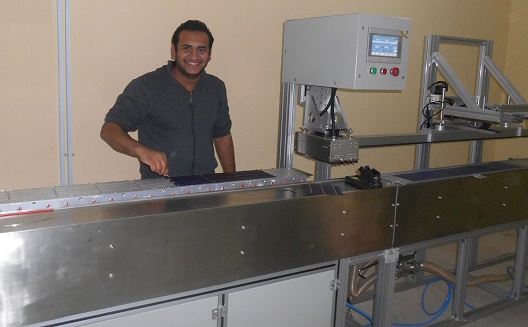Micro-production of micro-solar launches in Egypt


Tiba Solar CEO Ahmed Al-Abd (left) in December at his Cairo
factory as the company kicked into first production. With him is
Ain Al-Bee'ah chairman Ahmed Moawad. (Images via Tiba
Solar)
Two years after the Egyptian government opened the door to solar energy dozens of entrepreneurs have jumped in as panel installers, but so far only one has started making its own.
Yet the challenges Ahmed Al-Abd is facing may explain why this is the case.
The government’s target of 20 percent of energy sourced from renewables by 2020, prompted Al-Abd to pursue a longtime dream of establishing a solar panel manufacturing facility.
The idea to establish Tiba Solar, a micro-factory that makes and assembles solar photovoltaic panel units, started in 2013 when daily power cuts were at their peak and the power generation sector struggled to keep up with demand.
Al-Abd started out working with his father at Tiba Consultancy, an environmental consulting firm which helped factories address environmental issues such as toxic emissions, and seeing a strong need for energy efficient and renewable energy products, wanted to launch much sooner.
But thanks to Egypt’s infamous bureaucracy, he only got started in August last year.
Facing down Egypt’s Leviathan
Al-Abd said the Tiba Solar factory was postponed due to what he dubbed “a discouraging investment atmosphere”.
One of the challenges he faced was the bureaucracy of the Egyptian Organisation for Standardization and Quality (EOS).
“I [bought] the machines that were needed to start manufacturing the solar panels from China,” he said, but after the fact the EOS requested that the machines had quality certificates that adhered to European Union quality standards.
The EOS request was based on a legislation issued in February 2015.
“The machines I purchased did not have those certificates and they are extremely expensive,” he said. “For each machine, a certificate would cost between 50,000 euros and 70,000 euros (US$57,000 - $80,000).”

The first of Tiba Solar's panel manufacturing
machines.
After much negotiation with the EOS, Al-Abd received approval to apply French standards to his purchased machines. That was not without a cost, however.
“I paid EGP15,000 (US$1700) for each certificate,” he said.
Because of the inability to find a quick solution, the already-purchased manufacturing machines was stored in a warehouse in China for four months.
The many hurdles Al-Abd faced almost pushed him to look into launching his project in London, where he currently lives, but the high cost of labor stopped him from taking this step.
Al-Abd is still working to obtain a license for his 300 square meter ‘micro-factory’ from the Egyptian Industrial Development Authority (IDA).
“We still have not received the approval yet so we had to import the machines as if they were for commercial purposes,” he said. “The cost for importing the machines for industrial purposes would have been much lower.”
“This led to additional costs that were not calculated in our first budgetary estimations.”
The machines were imported at a total cost of EGP 200,000, or roughly $22,000.
Production finally starts
After overcoming many of these challenges, a pilot launched in August 2015 with four full-time technicians who’d travelled to India to learn how to operate the machines.
Their first real production began in December 2015. The factory currently has the capacity to produce the equivalent of 0.5 megawatts (MW) of panels at one time, but Al-Abd is aiming to upgrade that volume to 6 MW within the current year.

Making a solar panel.
Tiba Solar is not the first in Egypt to make solar panels. Other manufacturers include a facility in the military-owned Arab International Optronics and government-owned Arab Renewable Energy Company. But unlike these facilities Tiba Solar’s micro-factory targets a niche clientele of individual consumers rather than mass production.
“The [individual] panels’ capacity varies between 4 watts to 250 watts,” Al-Abd said, adding that with a micro-factory, production can be tailored to individual demand.
“Every day we take a step forward towards improving the quality of the panels produced while we introduce new technologies.”
Tiba Solar recently celebrated the production of its first flexible panel, which is a bendable panel that is cheaper to manufacture than the average solid photovoltaic panel and can be applied to any surface. The panel weighs 2.5 kilograms, which is notably lighter than the average 18 kilogram panel.

Making solar (more) socially conscious
The company has initiated the ‘Make it Yourself’ programme, teaching engineering students and regular people how to make their own panels, and partnered with Ain El-Bee’ah (Environment’s Eye) to convert the Cairo suburb of Tora from a low-income neighborhood to an environmental zone.
The project’s expected cost is around $16.9 million and is only just beginning.“We are seeking to introduce solar powered vehicles as well as ice cream vending vehicles that rely on solar power to refrigerate their products,” Al-Abd said.
The company is also working with the same partner to introduce building-integrated photovoltaics (BIPV) (pictured right). “This is when glass installed in buildings is mixed with solar panels… so instead of just being glass, it can be used to produce electricity,” he said.
The project is expected to start in April and is targeting 15,000 buildings.
Tiba Solar will continue to focus on environmental and innovative ideas but expanding its production to a mass level is not a goal.
”Having a small factory leaves room for flexibility and innovation,” Al-Abd said. “A small factory can alter its production and change the size of the produced panels while the panels produced by large factories remain the same size.”


